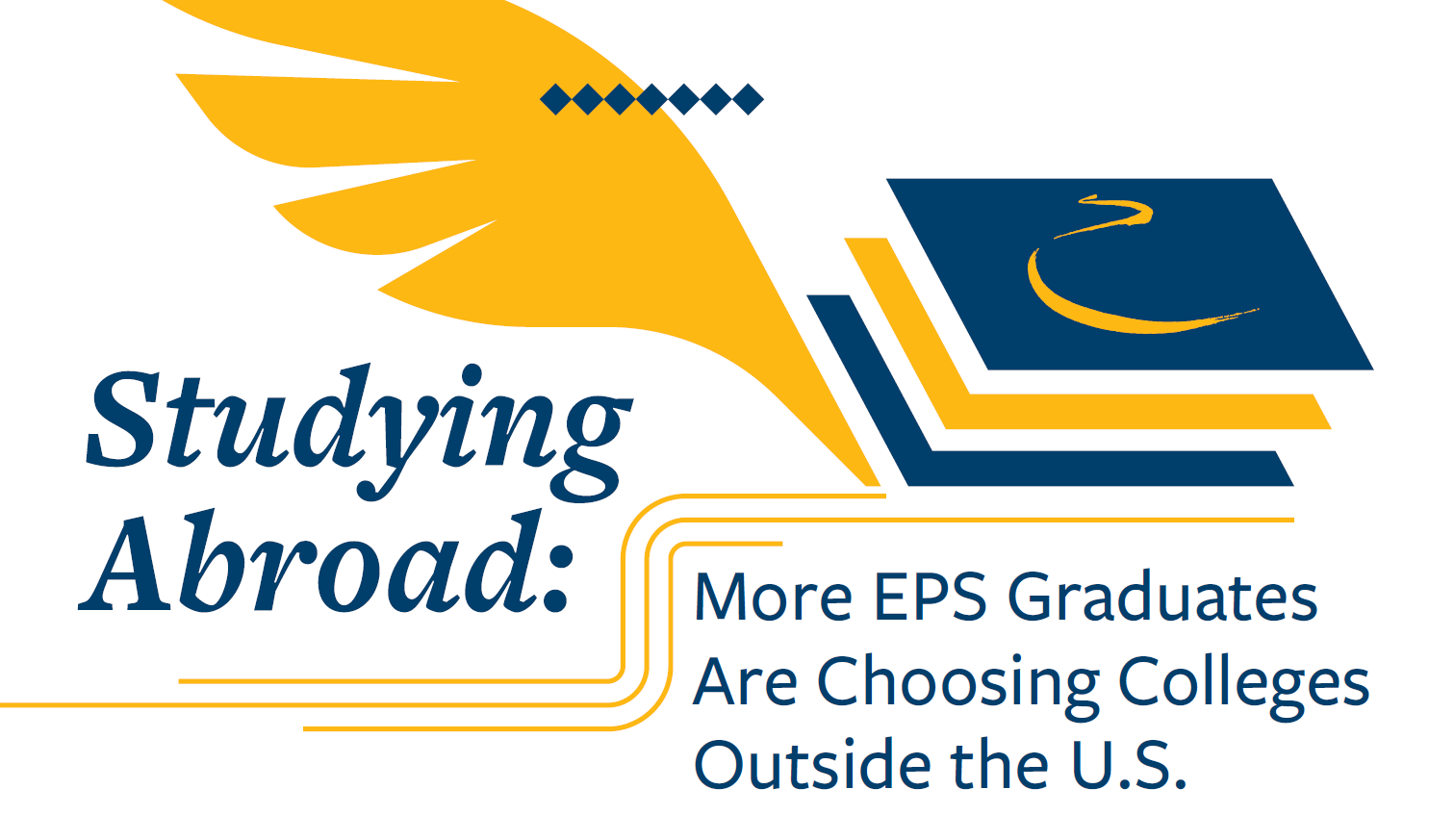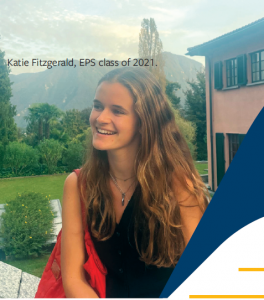
 One of the real pleasures in my job is seeing students navigate the next step in their lives after their time at Eastside Prep. While the vast majority of our graduates attend college in the United States, a growing number are considering other options. One option gaining momentum is attending college outside the U.S. It has long been popular to spend a semester or year studying abroad, but we now see more EPS students opt to attend an institution in another country for their full college career. From the first graduates in 2009 through the class of 2016, just five students selected options outside the U.S., and each of those was in Canada. Since the Class of 2017, twenty-six EPS graduates have picked a college outside the U.S. Canada is still the most common choice, but eight students in those years have chosen universities in six different countries. While those classes are growing larger, the percentage matriculating outside the U.S. has increased from 2.5% to 6.3% in those time frames.
One of the real pleasures in my job is seeing students navigate the next step in their lives after their time at Eastside Prep. While the vast majority of our graduates attend college in the United States, a growing number are considering other options. One option gaining momentum is attending college outside the U.S. It has long been popular to spend a semester or year studying abroad, but we now see more EPS students opt to attend an institution in another country for their full college career. From the first graduates in 2009 through the class of 2016, just five students selected options outside the U.S., and each of those was in Canada. Since the Class of 2017, twenty-six EPS graduates have picked a college outside the U.S. Canada is still the most common choice, but eight students in those years have chosen universities in six different countries. While those classes are growing larger, the percentage matriculating outside the U.S. has increased from 2.5% to 6.3% in those time frames.
I recently sat down with three of our graduates who chose this option. They talked with great enthusiasm about their experiences. Sydney McAffer graduated from EPS in 2019 and now is attending the University of Waterloo in Ontario, Canada. Katie Fitzgerald, EPS Class of 2021, is at Franklin College in Lugano, Switzerland; and Ben Spickett, EPS Class of 2022, is at Trinity College in Dublin, Ireland.
Every student’s college search and life once on campus is unique. Each of these three though, was really drawn to doing something different. “I was looking at schools in California and on the East Coast,” says Katie, “and it all seemed a little generic. Nothing spoke to me until I considered Franklin.”
In hearing about their experiences, it is easy to pick up on some consistencies in seeking a degree in another country. “Being so far away from home, I could not rely on my parents at all,” states Katie. “I just had to grow up faster.” Ben adds, “The college culture at Trinity is different from many U.S. universities. It is less campus-oriented. There is no meal plan, for instance. There also isn’t much campus housing. It is guaranteed for the first year, but then you are on your own. You learn to plan and find things for yourself—grocery shopping, meal planning, seeing a doctor—I find students lean on each other for support here.”
Another significant difference from the American college experience is the social scene. All three EPS graduates mentioned this fact. “There is no Greek life, and the party scene is way lower key than what I hear from friends in U.S. colleges.” Ben adds, “Things are much calmer here. Because the drinking age is 18, everyone is free to go to pubs. There isn’t the same fraternity-type scene here.” When they go out, students in all three colleges interact not just with other college students but with people of varied ages.
 Franklin’s curriculum is similar to U.S. institutions, but for Sydney at Waterloo and Ben at Trinity, the curriculum they are enrolled in is quite directed. Students in these universities start in a stated program and dive heavily into those studies right from the start. The classes from their program make up a much more significant percentage of overall coursework when compared to the percentage in most U.S. college majors. Students need to know what they want to pursue from the start; this works well for those with strong direction and interest.
Franklin’s curriculum is similar to U.S. institutions, but for Sydney at Waterloo and Ben at Trinity, the curriculum they are enrolled in is quite directed. Students in these universities start in a stated program and dive heavily into those studies right from the start. The classes from their program make up a much more significant percentage of overall coursework when compared to the percentage in most U.S. college majors. Students need to know what they want to pursue from the start; this works well for those with strong direction and interest.
Sydney has now graduated and is pursuing an advanced degree at Waterloo. She explained that her undergrad degree comprised eighteen required core Psychology classes, five other Psych electives, eleven more science electives, one English class, and just five other electives. Sydney’s course choices were focused enough that she graduated with two additional minors in Biology and Cognitive Science.
For Ben and Katie, education inside the classroom is only part of the appeal. “Dublin is a great hub for travel in the UK and Europe.” At Franklin, the curriculum and calendar are built to foster travel and exploration throughout Europe and beyond. Built into the semester is a one-week period in which all students travel in relation to one of their classes. It is described this way on the Franklin website: “Academic Travel represents the single most distinctive element of the Franklin curriculum, in which travel is used as an experiential learning tool completely integrated into a series of course offerings in disciplines applicable to all majors.”
Last year, Katie traveled through Morocco as part of “Reading Moroccan Culture.” This year, she is taking “Sustainable Development in Africa.” The students in the course will all be traveling to Eswatini (formerly Swaziland), where they will research and interview the country’s citizens. Even when she is not traveling, Katie is experiencing the learning that comes from simply living in another country. Franklin’s classes are all taught in English, so she underestimated her need to speak Italian. “When I leave campus, which is all the time, I must operate entirely in Italian.”
 Even for Sydney, life in Canada included plenty of cultural learning. “I’m a Canadian citizen, but a lot was new. Waterloo enrolls students from all over the world.” The student body at Waterloo comes from 120 different countries.
Even for Sydney, life in Canada included plenty of cultural learning. “I’m a Canadian citizen, but a lot was new. Waterloo enrolls students from all over the world.” The student body at Waterloo comes from 120 different countries.
There is so much to gain in life experience by choosing to study outside the United States. And this is even before one considers the relative cost. “I was originally looking mainly to study at U.S. colleges, and most of my interest was in private institutions,” Sydney states. “When I looked at finance, especially as a Canadian citizen, there was no real way to justify the cost of U.S. private colleges. I considered WSU and UW, but decided Waterloo just offered so much more for me.” For this year, tuition in her program is around $10,000 for a resident of the U.S. with Canadian citizenship. Additionally, Waterloo has a co-op program in which most students participate. These co-op work experiences are always paid. “I was able to pay my rent for the whole year on what I was paid during my co-op term,” Sydney told me.
Trinity, too, is far more affordable than most U.S. private universities. Costs vary by program, but tuition is about $20-24,000 for non-EU citizens. Even Franklin, priced more in the range of U.S. private institutions, offers merit scholarships to many U.S. students. These are just a few examples of higher education with great value for a much more reasonable price. Universities in the United Kingdom are increasingly marketing in the United States; their yearly costs are often half that of U.S. universities, and bachelor’s degrees are usually granted after three years of study. Universities in Australia and New Zealand also have an increased presence seeking American students. This appears to be a trend only gaining momentum.
All of this comprises very wise innovation for students who avail themselves of this education. These alumni are entirely positive about the experience. All three encouraged more students to consider this option. Ben adds, “You’re not cheated on your classroom education; you learn so much beyond the classroom.” As Mark Twain famously said, never let school interfere with your education.

